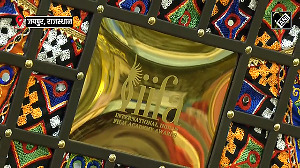When in Landour, says Supriya Newar, one of the most important things to do and that too in large measures, is to do nothing at all.

It has been a bit over two weeks since I have returned to my city and yet, one of the first visuals that persists when I wake up, are those rows of everlasting deodars (or devdarsas the locals call it) and a feeling of an untouchable sublimity.

"But you were there only for four days," remarks a friend. Her logic is fair. After all, how much of an impression can four days cast?
But was I in Landour only for four days? Or thanks to the literary deity of that town, the one and only Ruskin Bond, I'd been visiting it through his imagery and imagination for over two decades, until I was finally, actually there?

And so, meeting Landour in person, was akin to meeting a penpal; one whom you had been communicating with for ages, bridging the distance with notes and sentiments; one whom you had come to know quite a bit, but were yet to meet. Until you did.
Obviously, my delight knew no bounds, when I discovered, that all that I had read or imagined of my distant pal was more than true!

In today's day and age of bursting tourism, when hill stations are plagued with excess and unplanned construction and traffic snarls, and are a very far cry from their pristine, innocent days, Landour, at 7,500 feet, stands as a tall, gentle sentinel, guarding the copy book qualities of a hill station.
When in Landour, one of the most important things to do and that too in large measures, is to do nothing at all.
Unlike places that offer you a full menu of attractions and to-dos and to-sees, Landour is more of a mood that is best discovered sans map and plan, on foot.
And so, after checking into the hotel and fortifying myself with a steaming bowl of thukpa, I set out to lose myself in Landour, on foot.

A short walk, mostly downhill gets me to the famed Char Dukan, a corner that was eponymously named after precisely the four shops that once stood there, though now the count may have now gone up to five or perhaps six.
Right there stands the 'Tip.Top.Tea Shop' -- a tea shop that proudly flaunts its existence since 1910 and commands a jostle for its benches that offer seating and briskly serve piping hot noodles, pakoras and parathas.
I skip the tea but do land up going through their bookmark and postcard collection, picking up a bunch.

Quotations from Ruskin Bond and Sir George Everest turned into literary memorabilia. Of course, Ruskin Bond's books are available too. They are quite the holy grail of the land and a poster says that signed copies are available upstairs.
Upstairs, happens to be the post office, once a significant establishment that kept the sleepy tiny town connected to the farthest corners of the world.

Cerulean skies guide me along gentle bends and I come across a hand painted board that says 'Gun shooting point' under which lies an array of air pistols and a bulky air rifle. Stuck to a handsome cedar is a board packed with about fifty red and yellow and blue and green balloons, waiting to be shot.
The keeper of the point sits half crouching on one end, looking at me, the solitary traveller, with an expectant gaze. Taking note of the hope in his eyes, I purchase my dozen shots for a hundred bucks and take aim.
He's not particularly chatty, but keeps count of my shots and loudly hails my one single success, "Phata!"

For anybody who thinks that Landour is yet another rustic, hilly town of the Himalayas, think again. Landour derives its name from Llanddowror, a quaint town in southwest Wales in Great Britain.
A cantonment town, Landour once housed an infirmary for the wounded soldiers of the British Indian army and is dotted with colonial markings, from the Clock Tower (beyond which Indians were once not allowed) to the beautiful churches, the town cemetery and the bakehouse which started off as a parish communal oven in the mid-1800s.

Today, the Landour Bakehouse is somewhat of a legend and you must be ready to wait for your table. In fact, not just the table. One has to wait for its signage too, to be free of selfie clickers before one can get a clear shot under it.
A delicious aroma of all things well baked along with a large book shelf greets you as soon as you enter the bakehouse.
The bookshelf is stacked with books for sale by 'Mussoorie writers' -- Ruskin Bond, Ganesh Saili, Bill Aitken, Vishal Bhardwaj, Hari Dang, Stephen Alter and a few others. Also available are arty postcards by Elena Wadhera.

The Bakehouse boasts of not having wi-fi, playfully nudging you to converse with each other. Or yourself.
I walk out half an hour later, after having savoured one of the lightest, melts-in-your-mouth, cinnamon pancakes that I've ever had. The Landour Bakehouse has justified its fan following and rating.

I return to my hotel, Rokeby Manor, well in time to catch the setting sun as well as the magical winterline, a natural and rare phenomenon that is visible to the naked eye from precisely two places on the earth -- the Alps of Switzerland being one and Mussoorie being the other. It's a false second horizon that appears at dusk.

As I perch myself on an ample swing of a floral backyard put together with great taste by the manor, I take in the panoramic, changing hues of an everlasting valley and watch the sun go down, bit by bit. It is sheer zen.

My experience of Landour would be grossly incomplete without adequately accounting for Rokeby Manor.
Surrounded by breathtaking views of the Doon valley, Rokeby Manor is an intimate and elegant property that has gone through many avtaars and change of hands before being beautifully restored by Sanjay Narang to its current status as a charming boutique hotel, complete with suites and villas.

I've been allotted a single room (No 11) that is fairy-tale like, with its large wooden windows opening directly into the horizon and from where I get a stunning view of the night sky and the entire Doon valley. Venus seems to be looking over me like a guardian angel and I sleep with a sigh of gratitude pasted on my face.
For someone who has two slices of toast and a cup of coffee for breakfast every day, the mountains invariably give me a great appetite in the mornings. Emily's, named after Emily Eden, who was the erstwhile governor general's sister and wrote many memoirs, is where the spread is laid out on neat, white tableware.
Freshly baked croissants, cheese toasts, cutlets, waffles, pancakes and what not along with jams ranging from apricot and peach to orange and blueberry that are all homemade. There are omelettes and parathas too if you like. All topped with some crisp mountain air.
I'm joined by a school chum, who after braving the Delhi pollution, cannot seem to get enough of the Himalayan air.

About half an hour away from Landour lies the Jabarkhet Nature Reserve, a hiker's and nature lover's dream. The reserve has been an initiative of the late J P Jain, whose efforts of over five decades have helped create a rich, lush ecosystem of flora and fauna and we eagerly sign up for one of its walking trails.
Though one is allowed to do a trail on her/his own, we opt for a guided one to also learn a bit along the way.


Virendra, our guide is a nature enthusiast and talks to us about the behaviour and connectedness of trees as we walk past thick woods that are lined with giant oaks, cedars, pines and rhododendrons.
He also explains how Jabarkhet is one of the last remaining natural forest patches near Mussoorie that is connected to the Sivalik hills and thus forms an important wildlife corridor. Our guide urges us to return in the spring time to catch the flowers in bloom.

We conclude our three-hour long trail with a cup of tea under a spotless blue sky and faraway bird calls.
Later that evening, an early dinner turns out to be a simple but delicious Garwhali affair with farm fresh vegetables and straight-from-the-tandoor rotis.

Literally all roads in Landour, lead to Lal Tibba, the highest point of Landour, named so after its reddish-brown soil.
The meandering road, that is mostly flat barring a few patches of ascent, is dotted with delightful quotations that are stuck on waste bins or on trees and street corners and make you pause to ponder or pose or both.

We catch Tolkien's 'All those who wander are not lost' near La Villa Bethany and another one stuck appropriately on a giant oak that says, 'Every great oak was once a nut that stood its ground.'
There's a roof top café at Lal Tibba that charges you 50 bucks to go up and view the peaks from its installed binoculars, but is so noisy and crowded, with groups pushing and shoving for that perfect selfie (of course), that we quickly run away from there and perch ourselves next door at the Savoy Café, which is open on both sides and offers the same views minus the crowd and the binoculars.
The very unassuming and basic café lands up serving us fantastic bruschettas and risotto.

Descending from Lal Tibba, we decide on taking the other route back to Rokeby and I'm delighted to stumble upon a Calcutta connection in our amblings.
Perched on a bit of a ridge, Parsonage, the charming cottage and home of veteran actor Victor Banerjee, announces itself quite spiritually with Buddhist prayer flags fluttering in the air and signs of 'Silence' pasted all around to ward off the noisy weekenders who flock to Landour from Delhi.
Further down, we also see the Landour Cemetery, where many a British officer and his family rests, but decide not to click pictures of the tombstones.

And as if to bid us goodbye and wish us luck for our onwards journey, we find the doors of the very handsome 150-year-old St Paul's Church open and step into its quietude.

Immaculately kept, the church's precincts are beautifully serene.
While there's not anything particular to shop for from Landour, (if your bookshelf is already loaded with Ruskin Bond), there's always the hand knitted scarf or pahadi rajma (kidney beans) and pahadilahsun (garlic) or homemade jams and marmalade (From Prakash & Co next to the Bakehouse) or handmade soaps with labels like Himalayan Cedar or Wild Mint (from Arjun's) to take back with you to gift to friends.
And what do you bring back for yourself? Read on...

Why, of course, visions of clear blue skies that smell of hope and goodness, the whisperings and rustlings of tall trees that have stayed strong over centuries, a sunset that sets the valley ablaze and a promise to return to this little town that has left you smitten with its gentility, its charm.

Getting there
From most big cities, Landour, is one flight away.
One could fly to the Jolly Grant airport in Dehradun, which is well connected to most metro airports (including Kolkata) and then hire a taxi that would go up to Landour, via Mussoorie.
The drive is a pleasant one that gradually acquires an incline, the air getting a lot chillier after an hour-and-a-half and the vehicle too trudging more carefully, emitting occasional grunts and moans as it negotiates bends that become sharper.
But unless you get caught in some unruly traffic which is more of a weekend phenomenon, you should be in Landour in about 2 hours at the very most.
Staying
Though a bit of a pocket pinch, Rokeby Manor is sheer time travel. The spectacular views and the culinary treats are an added attraction.
La Villa Bethany is a pet-friendly, boutique homestay.
Devdar Woods, allso run by La Villa Bethany, is another picturesque option.
Best time to visit
Spring and summer can be floral and beautiful with a great respite from city heat, but is also more touristy.
Monsoons are avoidable.
Winter sets in from mid-November with the town becoming really cold and sometimes getting snowfall in December/January.
Supriya Newar is a writer and poet from Calcutta. Besides being a music aficionado, she is also an avid traveller, particularly drawn to places that have a je ne sais quoi about them. She may be reached on connect@supriyanewar.com. her Web site is www.supriyanewar.com

Feature Presentation: Ashish Narsale/Rediff.com











 © 2025
© 2025